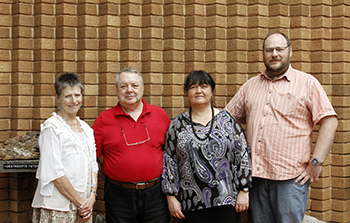Latest News Archive
Please select Category, Year, and then Month to display items
23 September 2020
|
Story Nitha Ramnath
|
Photo Supplied
 UFS students will be performing at the virtual ICDF on 24 September 2020.
UFS students will be performing at the virtual ICDF on 24 September 2020.
On 24 September 2020, South Africa will be celebrating Heritage Day. For the 25th anniversary of this celebration, South Africans are encouraged to celebrate their culture and the diversity of their beliefs and traditions in the wider context of a country that belongs to all its people. Dr Chitja Twala, Vice-Dean: Faculty of the Humanities at the UFS, says: “The importance of the day is that we must celebrate who we are and learn from each other.” The University of the Free
State (UFS) has a long tradition of commemorating Heritage Day and the ideas underpinning it. One way in which the UFS celebrates and recognises the tapestry of diverse cultures represented on its campuses is through its International Cultural Diversity
Festival hosted by the Office for International Affairs. The purpose of the event is to highlight on Heritage Day that international cultural diversity is a central tenet of the UFS community.
Pursuant to the tremendous challenges caused by the COVID-19 pandemic globally, the International Cultural Diversity Festival will this year be celebrated in a virtual format. Even during this uncertain time, it is important to find time to celebrate
our uniqueness and to appreciate one another’s heritage and culture in the spirit of our humanity.
Date: 24 September 2020
Time: 10:00
No registration is required!
For the 2020 Heritage Month celebrations, let us share elements about ourselves that make us proud of who we are! The diverse contributions to the 2020 virtual International Cultural Diversity Festival activities will highlight the university’s commitment towards creating a diverse, challenging intellectual environment. As a research-led university, the UFS strives to provide an environment in which new ideas are incubated and debated, contributing to its transformation process and African unity.
For more information contact Bulelwa Moikwatlhai on MaloB@ufs.ac.za
Famous mineralogists visit UFS Geology
2017-04-25

From the left: Prof Marian Tredoux, Associate
Professor at the UFS Department of Geology;
Prof Giorgio Garuti; from the University of Leoben,
Dr Federica Zaccarini, also from the
University of Leoben and Dr Freddie Roelofse,
Head of the Department of Geology at the UFS.
Photo: Rulanzen Martin
Years of academic friendship and collaboration is what makes Prof Giorgio Garuti and Dr Federica Zaccarini return to the University of the Free State (UFS) every so often.
The world-renowned academic duo from the University of Leoben in Austria were guest lecturers at the UFS Department of Geology. “We are here because we have known Professor Marian Tredoux and the Geology Department, for a long time. We are really happy to be here, and to be given the opportunity to present talks,” said Dr Zaccarini. The two are experts in platinum-group element mineralogy and each has given their surname to minerals namely, the Garutiite and Zaccariniite minerals.
Visit great advantage for research
They are acclaimed experts on very small minerals (smaller than a hundredth of a millimetre) with emphasis on platinum group elements in chrome-rich rocks. “Their visit is a great advantage for us. We also conduct research on these minerals and can learn from them,” said Prof Marian Tredoux, affiliated researcher at the Department of Geology.
Dr Zaccarini gave a lecture on Chromitites, and associated platinum-group elements, in ophiolites on Wednesday 5 April 2017 and Dr Garuti presented a lecture on Uralian-Alaskan complexes: a puzzling source of platinum, on Thursday 6 April 2017. During the talks they examined the association of the platinum-group minerals with chromite, rather than sulphide, and how this association can lead to the formation of unusual platinum-group element ores.
Collaboration on various academic papers
They and Prof Tredoux have collaborated on various research articles over the past four years, which have been published in various important international scientific journals. “These journals play an important role in calculating the H-scale which measures how important a researcher’s work is on an international scale,” said Prof Tredoux.